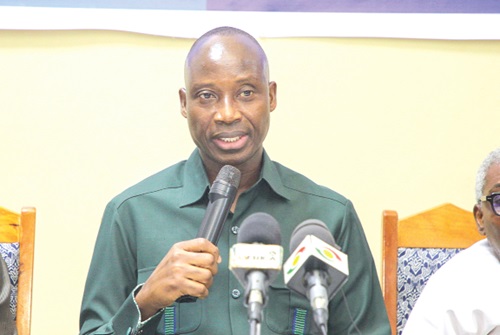The Government Statistician, Dr Alhasan Iddrisu, has said the Ghana Statistical Service (GSS) is undergoing rebranding aimed at transforming business data into actionable development outcomes to inform national planning and improve the lives of citizens.
He said GSS was shifting focus from simply collecting and disseminating data to generating insights that would support decision-making at all levels — from policymaking and implementation to monitoring and evaluation.
Dr Iddrisu made this known at the closing ceremony of the 2025 Integrated Business Establishment Survey Phase II (IBES II) Training of Trainers Workshop in Winneba.
Business survey
Building on the foundation laid by IBES I, which focused on enumerating every business unit across all sectors and sizes, IBES II will delve deeper by collecting detailed information from a scientifically selected subsets of establishments.
![]()
The audience during the event. Picture: CALEB VANDERPUYE
It will gather detailed data from a nationally representative sample of 44,652 establishments across all sectors.
The exercise is expected to support the rebasing of key national economic indicators, such as the Gross Domestic Product (GDP), the Producer Price Index (PPI) and the Index of Industrial Production (IIP).
At the training workshop, nearly 300 participants were taken through a 21-day programme to prepare them as national trainers.
From this group, 250 will be selected to train over 3,200 field officers in a nationwide exercise scheduled from June 15 to July 5, 2025.
Data collection, which starts today, is expected to end by September 10, with initial reports to be released by December 31.
The survey will also produce a series of reports on business operations, regional productivity, innovation, and sector-specific challenges — all intended to guide policy, improve business strategy and influence job creation.
Impact
Dr Iddrisu said the survey had already begun engagements with key stakeholders, including the Presidency, to support flagship programmes such as the 24-Hour Economy policy.
“The data we collect from the IBES will definitely inform the implementation of the 24-Hour Economy, the tracking of the progress government is making on it, etc,” he stated.
The Government Statistician added that the business community and households would also benefit from the data collected.
“We will engage the business community so that they can also have access to the data we collect for planning purposes.
Households would also be very relevant in this equation,” he said.
Describing the assignment as monumental, Dr Iddrisu urged the trainers to uphold the highest standards of professionalism and integrity.
“The data we collect will only be as reliable as the people who collect it and you are the first line of quality assurance,” he told them.
He also called on the trainers to approach their regional assignments with diligence and pride in service to country and data.
The Government Statistician then called on sampled businesses across the country to cooperate, adding; “This data is not just for the government; it is for Ghana.”

